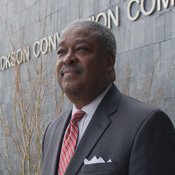Last session, the Mississippi Legislature enacted a referendum vote for a sales tax increase to fix city streets and improve public safety, but Jackson Mayor Harvey Johnson Jr. says that vote may be on hold indefinitely.
"I have had concerns about the provision (in state law) for a commission that would dictate how the money was allocated," Johnson told the Jackson Free Press Monday.
Gov. Haley Barbour signed Senate Bill 3268 into law March 11, authorizing the city of Jackson to hold a referendum vote on whether to approve an additional 1 percent sales tax increase. Legislators estimated back in March that the tax would annually generate at least $21 million, 70 percent of which is designated for road repair and 30 percent to hire and maintain police and firefighters.
Jackson Sen. John Horhna former Democratic candidate for mayor in the last electionauthored and championed the bill, and made numerous changes to its language to garner the approval of the tax-leery Senate. Sales exempted from the tax, for example, include transactions on food and beverages at restaurants, hotel and motel fees, retail food sales and television cable service.
One of the more controversial additions to the bill includes the creation of a nine-member commission that, according to bill language, must "approve the expenditure of revenue."
Former Ward 2 Councilman Leslie McLemore said the only way to get the bill out of the Legislature was to add a new layer of scrutiny by an authority outside city government.
"It was the only way that we were going to get the bill passed. Ordinarily, my thinking would be against it, but given the history of the Frank Melton administration for the last three and a half years, I think the commission was a safeguard, a guarantee that we were going to get the measure passed," McLemore told the JFP in March. "If we had had a normal administration with a normal mayorwith somebody with some accountabilityI would have protested."
The issue lies in the make-up of the commission. The mayor appoints three members who are subject to council confirmation, while the governor and lieutenant governor appoint two more commission membersboth of whom must be residents of the municipality. House Speaker Billy McCoy gets to appoint a nonvoting, "at large" member of the commission.
The city mayor appoints four additional members from a list of eight nominees provided by the "local chamber of commerce," however, which has no legislative requirement to choose nominees from Jacksononly that the nominees "represent businesses located within the city limits of the municipality."
That vague language, of course, does not differentiate between the Greater Jackson Chamber Partnership and its local division, the Jackson Chamber.
The Greater Jackson Chamber Partnership, an organization that some Jackson residents claims steers businesses toward the suburbs, could ultimately be the authority that selects commission nominees. Arguably, those commission members might not have the best interest of the city at heart.
Johnson expressed trepidation at the idea of commission approval on street-paving during his mayoral campaign, fearing the extra step could complicate the construction, while some council members puzzled over whether or not commission members could ultimately influence the city's selection of a contractor on some projects.
The mayor maintained his doubt Monday, arguing that state law already mandates who gets the final say on city expenditures: "We need to make sure that any measure that affects the taxpayers of Jackson has the proper representation, which in my opinion are the city's elected officials."
Johnson would not confirm if he was keeping the referendum on hold until legislators adapted the 2009 law to remove the necessity of the commission. He appeared to have scant faith in the possibility of that option, and instead put his confidence in alternatives outside the referendum to pay for new streets.
"I am more in support of the regional approach, where surrounding cities could enact the option as well, and the allocation of funding back to the municipalities would be based on population. This would help ensure that no one city's citizens shoulder all the tax burden and disrupt competition among businesses in the region," he said.
Ward 1 Councilman Jeff Weill said city residents would be better served without the additional tax, considering current economic hardship. "The referendum vote hasn't made it onto the agenda or even into a council discussion, but we've got a recession going on, and I'm far from favorably disposed to burdening our already overburdened taxpayers with another burden," Weill said.
"Now is just not a good time."



Comments
Use the comment form below to begin a discussion about this content.